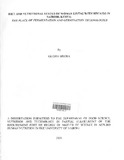Diet and nutritional status of women living with HIV/aids in Nairobi, Kenya: The place of fermentation and germination technologies
Abstract
In Kenya, porridge typically made from cereal flours is a common meal for children and
invalids (those living with HIV/AIDS included). Cereal porridges suffer from high
dietary bulk as a consequence of their high starch content. The cereals also contain
antinutritive substances which bind important micronutrients (zinc and iron) rendering
them unavailable. Traditional food processing techniques, such as germination and
fermentation have potential to modify starch content of cereals so that they do not thicken
and therefore don't require dilution. Also, among many other benefits, the techniques
have ability to increase bioavailability of zinc and iron. In light of the particular
amenability of porridge to both fermentation and germination food technologies; this
cross-sectional, descriptive and analytical study was carried out to provide a picture of
the state of affairs regarding use of the two technologies in its preparation. A sample of
150 was drawn from a population of 2,895 IDV/AIDS positive persons, registered
members of Kenya Network of Women Living with HIV/AIDS (KENWA).
Anthropometric equipments, guided questionnaires and focus group guides were the main
tools for data collection. Data were analyzed using SPSS computer software program.
Majority (80%) of the respondents were from female-headed households with Many
(63%) of the respondents having attained only primary level of education. The study
established that porridge was the most widely consumed food within the study
population, but the use of both germination and fermentation technology in porridge
preparation was extremely low (3%). Dietary intake for all nutrients analyzed including
total calorie, protein, iron and vitamin A was found to be inadequate, standing at
1674Kcal/day, 56.7g/day, 15.4mg/day and 2841lg/day respectively. Average total calorie
intake indicated a shortfall of about 30% from the recommended daily intake level with a
large proportion (83%) of the population recording inadequate intake. For protein, iron
and vitamin A; 70%, 53.3% and 100% respondents were respectively found to be taking
inadequate amounts from their diets. In the case of iron, the proportion of those with
inadequate intake could be much higher when bioavailability of the mineral from cereal
diets is taken into account. However, despite inadequate total energy intake levels
recorded among the study respondents, the average BMI for the population was within
normal range, being 22.4±0.37. In addition, 25% of the respondents were found to be
overweight (none obese). From the study it was concluded that majority of the population
prepared porridge simply by mixing fresh flour with water, then bringing it to boil. The
use of germination and fermentation technologies in the making of porridge was very low
(3%). Awareness campaigns to promote uptake of the two technologies in the preparation
of porridge is recommended.
Citation
Degree of Master of Science in Applied Human Nutrition in the University of NairobiPublisher
University of Nairobi Department of Food Science, Nutrition and Technology
Description
A dissertation submitted to the Department of Food Science,
Nutrition and Technology in partial fulfillment of the
requirement for the Degree of Master of Science in Applied
Human Nutrition in the University of Nairobi

